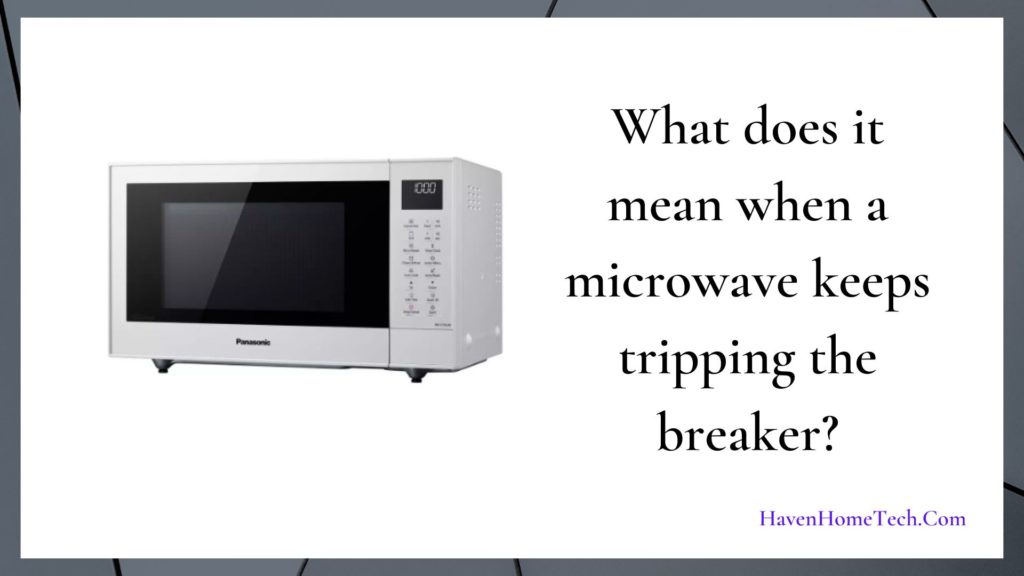Microwaves are an important kitchen device. They are convenient, simple to use, and may assist us in preparing tasty meals in a matter of minutes.
However, issues may emerge if your microwave begins to trip the breaker. If ignored, this may be both aggravating and hazardous.

Continue reading to learn what is causing this problem and how to resolve it.
Quick Navigation in this Resource
What does it mean when a microwave keeps tripping the breaker?
When a microwave continues to trip the breaker, it indicates that the circuit is overloaded. To prevent a potential fire danger, an overloaded circuit will force the breaker to trip.
Microwaves are high-powered gadgets that need a lot of power to operate. When you put your microwave into an outlet that already has other appliances or gadgets plugged in, an overload might occur.
It must be understood that a microwave may trip the breaker for a variety of reasons, including an overloaded circuit. Other causes, such as a faulty microwave or bad wiring in your house, might also be to blame.
What are the common causes of a microwave tripping the breaker?
Overloading the circuit
As previously said, overloading the circuit is the most typical cause of your microwave tripping the breaker.
If your microwave is hooked into the same socket as other high-powered appliances or gadgets, an overload may occur.
When this occurs, the breaker trips to safeguard your property from an electrical fire.
Faulty microwave
If your microwave isn’t working properly, the breaker may continue to trip.
For example, a damaged microwave control board or a faulty magnetron might induce an electrical short circuit, resulting in an explosion.
If your microwave is relatively new and has been operating properly until lately, a component in the microwave may have broken, leading it to trip the breaker.
Electrical issues in your home
Another possibility for your microwave tripping the breaker is a problem with your home’s electrical wiring.
Overloading can occur if there are electrical flaws, such as weak connections or frayed wiring.
This might also be a fire danger, therefore it’s critical to have it checked out right away.
How to troubleshoot why your microwave keeps tripping the breaker?
Below are some common troubleshooting steps you can take to identify and fix the problem.
Step 1: Determine the cause
First, determine the cause of your microwave tripping the circuit breaker. As previously stated, the most prevalent reason is circuit overload.
Thereafter, examine whether your microwave is sharing an outlet with other high-powered appliances or gadgets, such as a refrigerator or an air conditioner.
To minimize overloading, connect your microwave to a separate circuit.
In case you recently put a new appliance or item to the circuit, disconnect it and check to see whether the breaker still trips.
Step 2: Check the microwave’s power cord
If overloading is not the problem, the next step is to inspect the power cable of your microwave. Check that it is not damaged and that it is properly plugged in. If the cord is damaged, it is essential to replace it as soon as possible.
Step 3: Test a different outlet
If your power cable is not broken, try using the microwave on another outlet in your home. This will assist in determining if the problem is with the microwave or the outlet. If the microwave works fine on another outlet, the issue is with the outlet itself.
If the microwave works fine on another outlet, the issue is with the outlet itself. If the breaker is still tripped, the problem is with the microwave.
Step 4: Professional help
If the aforementioned measures do not address the problem, it is recommended to seek expert assistance. A competent electrician can evaluate your home’s wiring to identify whether there are any electrical problems.
Preventative measures
It is usually preferable to take precautionary precautions rather than having to fix problems. The following are some precautions to take to protect your microwave from tripping the breaker:
- Avoid overloading the circuit by connecting too many high-powered appliances or devices.
- To minimize overloading, use a separate circuit for your microwave.
- Check your electrical wiring and appliances on a regular basis to ensure they are in good working order.
- Invest in surge protectors to keep your appliances safe from power spikes.
- Replace any equipment or cords that are outdated or broken.
Conclusion
A tripped breaker can be aggravating, especially when it prevents your microwave from working. The most common cause of a microwave tripping the breaker is overloading the circuit.
Faulty wiring and a defective microwave, on the other hand, may be to blame. Troubleshooting the problem and implementing preventative actions can assist in resolving the issue and preventing it from recurring in the future.
To avoid electrical risks, always seek expert assistance if necessary. You can protect the safety and lifespan of your microwave and electrical equipment in your house by following these procedures.